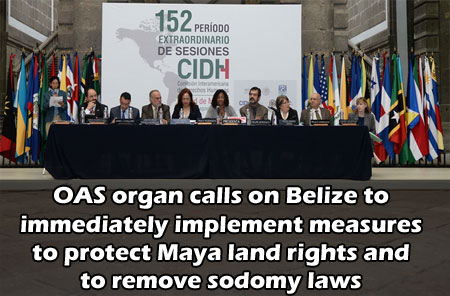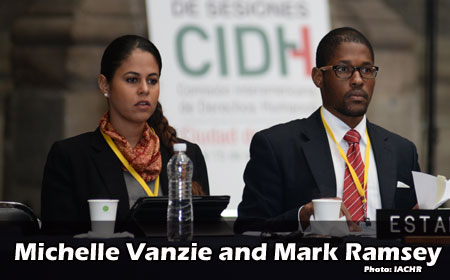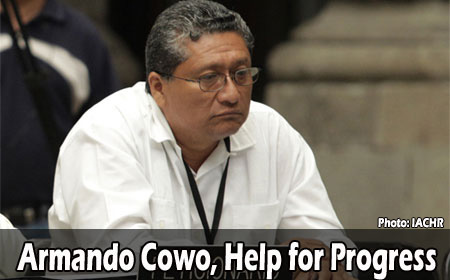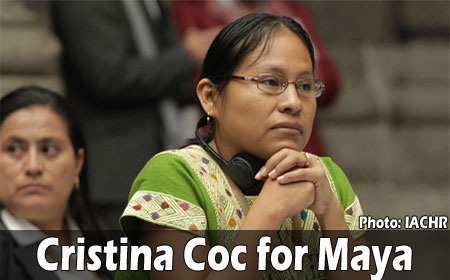BELIZE CITY—In a recent meeting held in Mexico City, the Inter-American Commission on Human Rights (IACHR), an organ of the Organization of American States (OAS), called out Belize over alleged human rights violations against the Maya community, migrant workers and the LGBTI (lesbian, gay, bisexual, transsexual and intersex) community.
The IACHR, which took issue with the provision in Belize’s Immigration Act, which, it says, expressly bans entry to “any prostitute or homosexual or any person who may be living on or receiving or may have been living on or receiving the proceeds of prostitution or homosexual behavior,” also condemned Belize’s sodomy laws, saying they are “unacceptable, even when they do not lead to criminal prosecutions…” The IACHR said that Belize should “take measures to fully protect the rights of LGBTI migrants.”
Meanwhile, the Inter-American Commission on Human Rights is calling for Belize’s immediate compliance with its recommendations on Maya land rights, which include demarcation and titling of lands, as well as repairing environmental damage caused by logging in Toledo.

Cristina Coc, representative of the Maya Leaders Alliance, traveled to Mexico City last week where she had a chance to present the case of the Maya at the 152nd Special Session of The Inter-American Commission on Human Rights (IACHR), held Monday, August 11 to Friday, August 15.
Coc said that way back in 2004, the Maya Leaders Alliance petitioned the IACHR and the Commission issued recommendations to the Government of Belize. For the past 10 years, she has been the point person dealing with this issue at the level of the IACHR.
Coc said that the IACHR is “definitely stepping up the pressure.”
“Three or four commissioners spoke with me directly after the hearing. I was also encouraged to see that the Government sent representation for the first time,” she said.
“This is the first time [I] see them [the IACHR] being very aggressive, even in just their writing and being direct and blunt,” Coc told us, when we asked her whether the IACHR has any teeth at all to see that these recommendations are put in place.
Coc said that indeed, the recommendations are not binding in Belize and there is nobody to police the state, so it is left up to Government to show that it has the political will.
Although the IACHR has issued recommendations and not mandates, the Commission of the OAS still expects the Government of Belize to comply by putting in place measures to adopt its recommendations.
Until this year, the Government of Belize had not appeared before the Commission to defend its position in petitions filed by the Maya, but this year, it sent a delegation comprised of staff from the Belize Embassy in Mexico, including Michelle Vanzie, Deputy Chief of Missions for Belize in Mexico City, and Mark Ramsey of the Attorney General’s Ministry.

Coc said that at the Mexico meeting, the Maya Leaders Alliance called on the Inter-American Commission on Human Rights to lead mediation talks between the 38 Maya villages of Toledo (which won their land rights claim in both the Supreme Court and the Court of Appeal), the Government of Belize and US Capital, which is about to drill for oil on territory that these communities continue to assert is Maya ancestral land.
Coc emphasized that this mediation is different from the court-connected mediation which Madam Justice Michelle Arana had recently ordered for the Government of Belize and four Maya villages which lie adjacent to the Sarstoon Temash National Park, where oil drilling is scheduled to commence this month.
The MLA rep said that they had also asked the IACHR team to continue to emphasize and pressure the Government to uphold international standards for engaging the Maya people, especially because of the urgency of oil development on Maya lands.
Meanwhile, the representative from Help for Progress, Armando Cowo, has been mostly focused on migrant workers and their rights, Coc said.

In his presentation to the IACHR, Cowo stated, “We have seen that in Belize, situations occur that undermine the fundamental rights of LGBTI people, including: a) The discrimination that employers exercise when offering work opportunities, who upon learning of the sexual preference or status of persons require HIV tests, as well as tests to verify the non-existence of sexually transmitted diseases in order to use these results as a justification for not hiring them. b) Other scenarios of discrimination, but mostly of persecution are the ones stated by the Belizean legislation when prohibiting entry to Belizean territory if the person declares his or her preference or if he or she is perceived as such; and also, the penalty of ten years imprisonment set to those who have sexual relations between persons of the same sex.
“I know that Help for Progress was in contact with the LGBT group. They expected them to show up but they were not present,” said Coc.
She said that they had less than two weeks’ process to apply to appear as petitioners and they had to move speedily to put together their presentation. Coc said that she would have loved to work with Help for Progress to do a joint presentation.
We asked Coc whether the same offer would have been extended to UNIBAM, the LGBTI lobby group in Belize, and she said, “absolutely,” and later added that “presenting [a] joint statement is far more beneficial to all parties involved.”
According to a press release, the Inter-American Commission on Human Rights, which held public hearings for all 7 Central American countries, has reported that more than 60 civil society organizations from those countries and representatives of each of those States participated in the hearings, which, it said, were well-attended by the public at the Palacio de Minería of the National Autonomous University of Mexico (UNAM).
According to the IACHR, “the general human rights situation in Belize” was up for discussion, and among the issues raised were charges that “certain measures by the authorities” do not allow migrant workers to unionize; and that HIV tests are required of migrants. Like the hearings of all Central American countries, except for Costa Rica, the LGBTI issue was also raised in the Belize hearing.
“In the hearing on Belize, the organizations also discussed their concern over the fact that there is still legislation in place criminalizing consensual sexual relations between same-sex adults in Belize. These laws are unacceptable, even when they do not lead to criminal prosecutions,” the IACHR said.
“Participants also discussed the situation of the Maya peoples in Belize, due to the granting of concessions to companies that exploit the natural resources in Maya ancestral territories,” the IACHR said.
“The [MLA] representative …talked about the importance of respecting the right of indigenous peoples to prior consultation concerning any project developed on their lands,” the Commission added.
It added that participants also raised concerns with respect to immigration legislation in Belize prohibiting certain people from entering the country based on their sexual orientation.
Amandala readers will recall that LGBT activist, Maurice Tomlinson, a Jamaican married to a homosexual Canadian pastor, is suing both Belize and Trinidad at the Caribbean Court of Justice, over their immigration laws, which he claims violates his right to free movement as a CARICOM national. That case, as well as the challenge by UNIBAM to Belize’s sodomy laws, is still before the courts.
Meanwhile, the Commission said that it calls on Belize “…to take measures to fully protect the rights of LGBTI migrants.”
Turning to Maya land rights, a matter which is also being litigated at the Caribbean Court of Justice, the IACHR said that it “…expresses its deep concern over the State of Belize’s failure to comply with the recommendations contained in its report on the merits in the case of the Maya Indigenous Communities of the Toledo District, published by the IACHR in 2004.”
The Commission said that contrary to its recommendations in its 2013 annual report, “the State of Belize allows oil development and illegal logging in Maya territory without the free, prior, and informed consent of the Maya peoples with regard to the use of the lands they own.”
It said that, “Moreover, the authorities, without consultation or consent, are building a paved road that goes through many Maya villages and will extend to the Belize-Guatemala border.”
It also noted that it had asked Belize for information, which the state has not provided, and that Belize had cancelled two scheduled meetings with the IACHR to address the matter.
“Another matter the IACHR considers unfinished business for the State of Belize is the lack of protection for LGBTI persons, especially with regard to their labor rights, through the real implementation of inclusive public policies,” the Commission said.
In speaking with the media last week, US Ambassador to Belize, H.E. Carlos Moreno, said the US Government is committed to promoting human rights for all persons, and by that he also meant the LGBT community, to which Moreno conceded that the US Government had provided funding “to address issues of stigma and discrimination” and to fund HIV/AIDS awareness.
Moreno contended that, “The question of LGBT rights is really just a subset of rights that attach to everyone,” and “the protection of LGBTI rights is part of an overall umbrella of protection for any and all marginalized groups,” which, he said, also include the Maya and the Garifuna.
We asked Coc whether she is concerned that the LGBT rights issue could overshadow the issue of Maya land rights, and she said that she does not believe that that would happen.
Coc said that “the Government is obligated to uphold the human rights of all people and to begin to adhere to international standards for human rights.”
Has the LGBTI issue been discussed among Maya leadership? Coc said that it has not, except for broader references in the context of human rights discussions led by their attorney, Senior Counsel Antoinette Moore.
Coc said that the Government is obligated to take these issues seriously and to realize that it has failed on a number of fronts with respect to human rights, whether they are for gays and lesbians, migrant workers, minority groups, or indigenous peoples, she said. The Government has the obligation to begin to set a good record with the way that it addresses these issues, Coc said.

